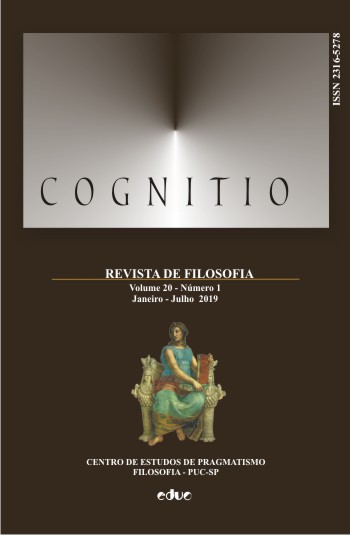Forma x Potência: Pragmatismo e a onda do espinosismo
DOI:
https://doi.org/10.23925/2316-5278.2019v20i1p48-61Palavras-chave:
Espinosa, Forma, Peirce, Potência, Pragmatismo.Resumo
Eu inicio por introduzir algumas citações que Peirce faz sobre Espinosa. Poucos, mas importantes comentários, sugerem que uma nova consideração da “essência” filosófica pode emergir dessa análise. Conforme lemos na Ética de Espinosa, essência (ou significado, em termos contemporâneos) não deve ser considerada como forma pura; tampouco é uma qualificação definida com designações rígidas. Significado é potência: em termos pragmáticos, como buscarei demonstrar, a potência de estar pronto para agir, expandindo a própria disposição para responder, encarnando dado hábito de modo eficaz. Assim, não procede que o significado é, de modo acabado e de uma vez por todas. Antes, este se faz na medida em que é capaz de produzir novos efeitos. Como disse Espinosa, é uma potentia agendi, um conatus inexaurível que sempre produz uma prontidão para perseverar na ação. Conceitos são mensuráveis à luz de seus resultados: expandem seus efeitos como uma floresta, ou onda, sem uma fronteira ou limite claros. Nossa concepção desses efeitos é o todo de nossa concepção do objeto, diz a máxima pragmática. Significado implica um vasto oceano de consequências inesperadas, Peirce escreve (CP 8.176). Em termos espinosistas: ninguém sabe até onde chega o poder da mente – ou do corpo. Lançarei mão de algumas sugestões de Giorgio Agamben e Gilles Deleuze a este respeito, tendo-os por base para abordar a ética de Espinosa em termos pragmáticos e o pragmatismo numa forma espinosista.Downloads
Publicado
2019-09-10
Como Citar
Fabbrichesi, R. (2019). Forma x Potência: Pragmatismo e a onda do espinosismo. Cognitio: Revista De Filosofia, 20(1), 48–61. https://doi.org/10.23925/2316-5278.2019v20i1p48-61
Edição
Seção
Artigos Cognitio









